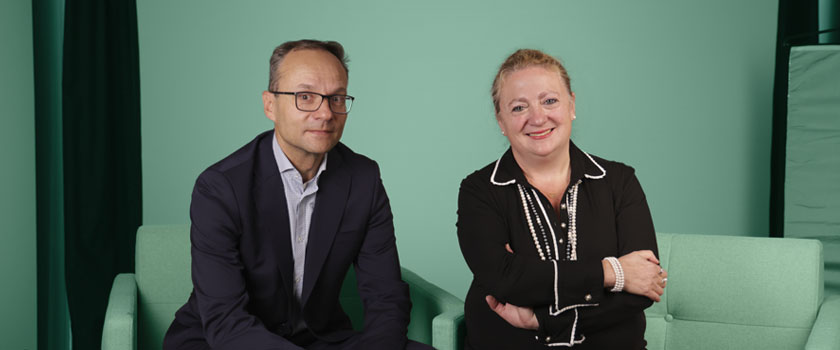Option Finance (26.03.2021) – Impact investing – investing with the intention of having a positive impact on the environment and society – originated in the private equity market but is now spreading to all asset classes.
This article is based on an Option Finance round-table discussion involving several experts, including Mathieu Nègre, Portfolio Manager Emerging Market Impact Equities at UBP .
Impact investing is increasingly popular: what are the main trends in this field?
In emerging markets, impact investing is growing at the same rate as in other asset classes, although its growth is hard to estimate because we need to distinguish between ESG, impact and thematic funds. If you combine those categories, we have seen growth of over 100% in the last few years. Depending on how you define impact investing, its share of assets could range from a few percent to 25% if you regard thematic funds as impact funds. Just focusing on our own business, demand is very strong. The previous generation of sustainability products were ESG-based. However, integrating ESG criteria did not really result in a separate range of funds in the emerging-markets space, whereas in developed markets there was a clear segmentation between ESG and non-ESG funds. In emerging markets, ESG analysis was mainly integrated into the existing investment process. For a long time, asset managers focusing on emerging markets have been stressing the importance of governance for their investees. But in the last two years, we have seen a real shift, and it accelerated in 2020. We have seen the appearance of distinct ESG or impact products. As regards impact products, particularly those offered by UBP, we think that we only have around 10 competitors, and they have launched their funds in the last two years. They are all in the early stages of their development, but they are likely to grow rapidly because investors are now ready to invest in distinct products, which is a real step-change. This shows the importance of clearly defining what we mean by impact investing. Most asset managers offer open-end products and mandates that have clear targets and differ from one another.
At UBP, when designing our first impact product we decided to build our own in-house methodology, which we could then apply to all our other impact products, regardless of the region or asset class.
Money is mainly flowing into emerging-market and Asian equities, but comes from developed markets. Inflows from local investors are extremely small. Finally, I’d like to point out that impact investing has a longer history in private equity than in listed assets. The notion of impact investing comes from private markets. Historically, emerging markets have accounted for a very large proportion of inflows, almost half of all private-equity assets. For a long time, there have been private equity funds investing with a social purpose and in renewable energies, particularly in Africa. So there are good reasons to believe that emerging markets will account for large proportion of impact investments in the listed segment.
Do all impact funds take ESG criteria into account?
It’s true that some companies become impact investments by accident, particularly producers of energy-saving equipment and other manufacturers. Some companies offer very important energy transition solutions, but they didn’t necessarily arrive there out of conviction, through an awareness of climate change issues, but rather they got there opportunistically, because they realised they had skills they could apply in that area. So not all of them have an ESG policy, even though they operate in the energy transition field. Shareholder engagement can play an important role for those companies.
Don’t you also need to adjust your methods according to the asset class?
As emerging-markets specialists, we deal with a range of very different countries by definition. So investors often ask us whether it’s possible to give the same rating to companies in Chile, South Africa and South Korea, and whether those ratings are arrived at with the same rigour as in developed markets. The answer is yes and no. In terms of the principle, we use the same methodology as we do in developed countries: we use the same criteria, but the rating always depends on the context.
There are a number of indicators that are potentially useful – carbon emissions, water usage, the number of jobs created – but the context is just as important.
For example, we have invested in companies that provide access to electricity and drinking water in developing countries. They clearly improve people’s wellbeing. But the same activities in developed countries cannot be regarded in the same way, because access to electricity and water is not an issue there. Regardless of the figure we are looking at, it depends on the context. When we try to assess intentionality, we run up against the same problem. In Europe, reporting and transparency are very good, but that’s not the case in other countries and particularly not in emerging-market countries. Some countries have made progress: transparency sustainability matters is good in South Africa and Brazil, but not so much elsewhere. In markets that are lagging behind in these areas, when we identify a company that is making an effort and has a genuine CSR policy, it’s a real gem in our view because that’s not a requirement imposed by local regulations, it’s a decision made by an entrepreneur or shareholders.
Is shareholder engagement necessary for companies to make progress?
We are particularly keen on shareholder engagement, because it allows us to push companies in the right direction. It goes hand-in-hand with the notion of impact investing. In addition, the concept of impact investing is almost unknown among emerging-market companies. Several times, we have been the first to broach the subject with a company’s management, even when the company specialises in a sector that has a high social or environmental impact. For example, we began a discussion with a company called Direcional Engenharia in Brazil, and it was the first time they’d heard the phrase “impact investing”, even though its business is focused on social housing. In investor conferences, we are sometimes the only ones asking questions about sustainability, and often the only ones wanting to spend any significant time discussing it. For all the companies we meet, engagement is an important part of our approach.

Mathieu Nègre
Portfolio Manager Emerging Market Impact Equities
Go to his Linkedin profile.








